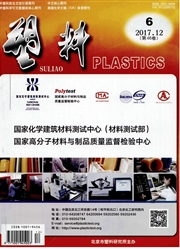

 中文摘要:
中文摘要:
选用稀土β成核剂WBG,研究了不同加工温度下WBG自组装成纤效应及其对聚丙烯(PP)结构与性能的影响.结果表明:在190 ℃时,WBG不溶于PP熔体.WBG仅能发挥成核剂的作用,提高PP的韧性.在210℃以上时,WBG可溶于PP熔体,并在冷却过程中自组装形成纤维结构,诱导PP在其表面附生结晶形成β型杂化串晶结构,因而WBG改性PP样品的性能得到极大改善.相较于纯PP样品,WBG改性PP样品的拉伸强度和冲击强度达到42.3 MPa和8.3 kJ/m2,比纯PP样品的30.1 MPa和4.1 kJ/m2,分别提高了41%和104%.
 英文摘要:
英文摘要:
Rare earth β-nucleating agent WBG was selected to study its self-assembled behaviors at different processing temperatures and the subsequent influence on the structure and property of isotactic polypropylene (iPP). The results demonstrated that WBG was unsolvable in the melt of iPP at 190 ℃, and therefore WBG only played a role of nucleating agent to enhance the toughness of the samples. However,when the processing was conducted over 210 ℃ ,WBG solved itself in the melt of iPP,and selforganized into a fibrous structure in the subsequent cooling which induced the iPP lamella to grow on the surface of the fibrils forming hybrid shish structure of β-type. As a result, tremendous enhancement of mechanical properties was achieved in WBG modified iPP samples. Compared with pure PP samples, the tensile strength and impact strength of WBG modified iPP samples increased from 30.1 MPa and 4.1 kJ/m2 of pure PP samples to 42.3 MPa and 8.3 kJ/m2 ,respectively,increased by 41% and 104 %.
 同期刊论文项目
同期刊论文项目
 同项目期刊论文
同项目期刊论文
 The formation and evolution of the hierarchical structure of polyethylene pipe during extrusion proc
The formation and evolution of the hierarchical structure of polyethylene pipe during extrusion proc Control of rotation extrusion over shish-kebab crystal alignment in polyethylene pipe and its effect
Control of rotation extrusion over shish-kebab crystal alignment in polyethylene pipe and its effect Effect of the Mandrel Rotation Speed and Inner Wall Cooling Rate on the Performance and Structure of
Effect of the Mandrel Rotation Speed and Inner Wall Cooling Rate on the Performance and Structure of In-situ microfibrillation of polystyrene(PS)/polybutene-1 (PB-1) composites prepared via melt drawin
In-situ microfibrillation of polystyrene(PS)/polybutene-1 (PB-1) composites prepared via melt drawin Controllable reinforcement of stiffness and toughness of polypropylene via thermally induced self-as
Controllable reinforcement of stiffness and toughness of polypropylene via thermally induced self-as Effect of Die Temperature on Morphology and Performance of Polyethylene Pipe Prepared via Mandrel Ro
Effect of Die Temperature on Morphology and Performance of Polyethylene Pipe Prepared via Mandrel Ro Formation and Alignment of Hybrid Shish-Kebab Morphology with Rich Beta Crystals in an Isotactic Pol
Formation and Alignment of Hybrid Shish-Kebab Morphology with Rich Beta Crystals in an Isotactic Pol Joint effects of rotational extrusion and TiO2 on performance and antimicrobial properties of extrud
Joint effects of rotational extrusion and TiO2 on performance and antimicrobial properties of extrud Preparation of polypropylene/glass fiber composite with high performance through interfacial crystal
Preparation of polypropylene/glass fiber composite with high performance through interfacial crystal Control over β-form hybrid shish-kebab crystals in polypropylene pipe via coupled effect of self-ass
Control over β-form hybrid shish-kebab crystals in polypropylene pipe via coupled effect of self-ass Biaxial reinforcements for polybutene-1 medical-tubes achieved via flow-design controlled morphologi
Biaxial reinforcements for polybutene-1 medical-tubes achieved via flow-design controlled morphologi 期刊信息
期刊信息
